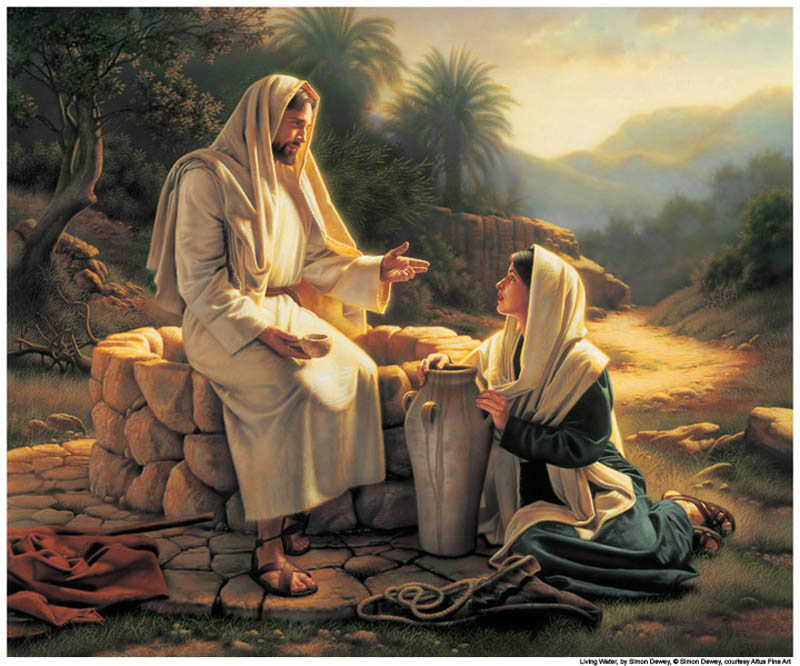
I’m probably the only one who has this problem. I confess, my mind wanders when I take the Sacrament.
I have a pretty good understanding of the gospel of Jesus Christ, and I certainly love, honor, and obey Him as best I can, but I simply must try harder. I’m still reading The Infinite Atonement and from what I’ve read and understood, I am running out of excuses, justifications, and rationalizations. It’s time for me to take a step up the ladder of my spirituality and match my living to the testimony in my heart.
Elder Callister wages a brutal argument that has caused me to re-evaluate my introspection. Please indulge my thoughts as I process a reconversion of my personal witness.
During the time I was reading his chapter on the Ordinances related to the Atonement (Ch. 24), I had the opportunity to attend three back-to-back sessions at the temple. I wanted to really concentrate on the covenants we make and why they are covenants that we need to make.
Adam performed a Sacrifice when he was given no guidelines, knowledge, or understanding of why. The angel later taught him that this sacrifice was in “similitude of the sacrifice of the Only Begotten of the Father”. He was told to perform his labors “in the name of the Son”, to repent, and to pray. He was given the Holy Ghost, “which beareth record of the Father and the Son”, with the charge to remember. But if he/we fall, we “mayest be redeemed” (Moses 5:6-9).
We are charged to choose the gospel of obedience, staying free from sin at all times. We are also charged to serve, to be compassionate, to remember, and to represent, Jesus Christ always.
For us, the Great Sacrifice is The World. We must sacrifice the things of the world (and the god of the world), in order to choose Father, remember Christ, and be redeemed. Our step-by-step guide is to repent, pray, and listen to the Holy Ghost, who testifies of the only Way, the Truth, and the Light.
In his book, Elder Callister likens the Sacrament to a weekly memorial service. He quotes Brigham Young who said, “Is this custom [the sacrament] necessary? Yes; because we are so liable to forget” (pg. 286). Wasn’t that the downfall of the Israelites? Those “dummies” would always forget, even after seeing so many miracles! I can be dumb like that too.
So, if we are truly spiritual beings, but we feed only on temporal porridge, our soul is starving toward spiritual death. The true feast only comes at the sacrament table. Elder Callister says, “Some come to the banquet table each week with pitchers, ready to catch and drink every drop of eternal life that is offered. Others come with cups—and still others with yet smaller receptacles”  (pg. 288). Jesus has promised us that He is the only Living Water and only He can fill our spiritual needs. When we partake of the Sacrament, it is Jesus’ love that fills us with appreciation, peace, and a feeling of self-worth in the Kingdom of God.
(pg. 288). Jesus has promised us that He is the only Living Water and only He can fill our spiritual needs. When we partake of the Sacrament, it is Jesus’ love that fills us with appreciation, peace, and a feeling of self-worth in the Kingdom of God.
Gerald Lund has shared an account of a climbing instructor who was saved by his “belayer” (a climbing partner who holds your anchoring rope while rock climbing).
Alan Czenkusch once fell from a high precipice, yanking out three mechanical supports and pulling his belayer off a ledge. He was stopped, upside down, ten feet from the ground when his spread-eagled belayer arrested the fall with the strength of his outstretched arms. ‘Don saved my life,’ says Czenkusch. ‘How do you respond to a guy like that? Give him a used climbing rope for a Christmas present? No, you remember him. You always remember him’ (pg. 290-91).
Brother Lund ends with this thought, “Those very words are the words of the sacramental covenant.”
In the LDS Church, we are not taught to meditate, like other religions. However, when we remember what Jesus Christ did, we meditate through self-examination. Elder Callister says, “During the sacrament we become witnesses against ourselves”. He continues, “The sacrament is a time to meaningfully reflect upon the life of the Savior, to examine and match our own life against his perfect example, and then to resolve to narrow the gap” (pg. 292).
Temples are given to us to not only complete essential eternal ordinances necessary to return back to the presence of the Father, and stay, but to provide for us a place to meditate, and remember, He who saved us from the fall. Elder Callister describes the tabernacle, how everything: furniture, clothing, representations, etc. were placed there with the sole purpose to bear witness,  “in typology, symbolism and similitude of Jesus Christ and his atoning sacrifice.” (pg. 294) Do we take the time to connect the dots? To meditate upon how our Savior is in the very design and detail of the temple?
“in typology, symbolism and similitude of Jesus Christ and his atoning sacrifice.” (pg. 294) Do we take the time to connect the dots? To meditate upon how our Savior is in the very design and detail of the temple?
When we partake of the Sacrament, do we take a step closer, and remember to deeply thank the Savior for His loving sacrifice? Likewise, when we attend the temple, do our spiritual eyes see Christ in everything, causing us to remember, fill us with gratitude, remake our covenants, and bring our spirits into contrition.
Quoting Kipling (pg. 285):
The tumult and the shouting dies—
The Captains and the Kings depart—
Still stands Thine ancient sacrifice,
An humble and a contrite heart.
Lord God of Hosts, be with us yet,
Lest we forget—lest we forget!